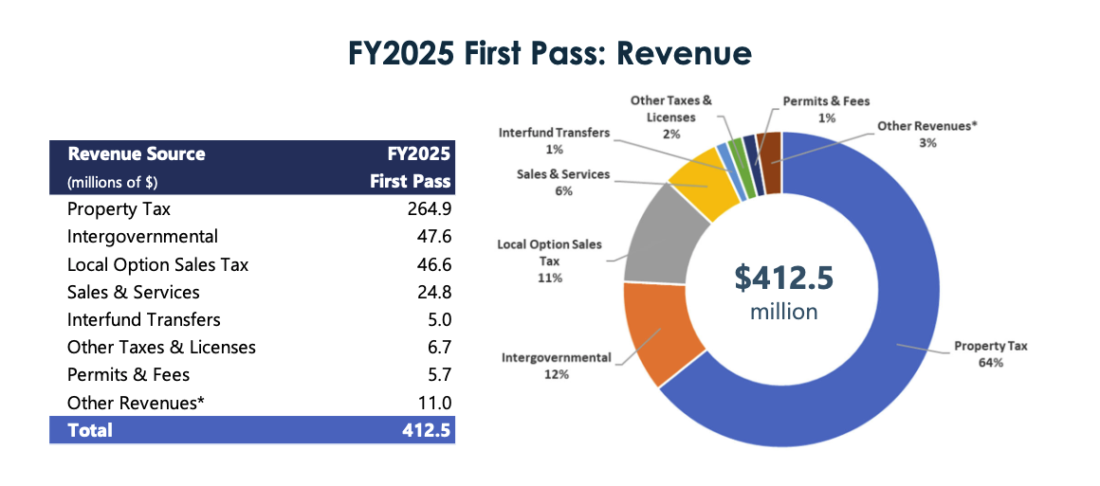As economic indicators show slowing growth in segments of the local economy, the Buncombe County Board of Commissioners began the annual task of prioritizing next year’s spending at the first of several work sessions March 26.
County staff reported sales tax revenue growth continues to slow from a peak in 2022 and occupancy tax collections are down 3% year-to-date compared with last year. That, along with expiring funding from the American Rescue Plan Act, has the county projecting essentially a no-growth budget. Buncombe expects to have only $200,000 more to spend in a $412.5 million budget, despite increasing property values.
Commissioners voted last year to increase the tax rate by 1 cent to 49.8 cents per $100 of property tax value to help pay for raises for local teachers. Assuming the same tax rate, staff is projecting a 3.5% bump in tax revenue from a property tax base worth $52.9 billion. Property taxes comprise 64% of the county’s budget.
Meanwhile, sales tax revenues are projected to come in about 7% less than what was budgeted for last June, leading to a more modest overall projection in 2024-25, which starts July 1.
On the expenditures side of the ledger, staff is requesting 45 new positions across the county. Employees will receive a 4.89% cost of living boost in 2025, based on the county’s formula comparing the last two years’ consumer price index.
Overall, the county is projected to spend 5.4% more in 2024-25 than the current year’s projections. The county’s largest expense, education, was not discussed at the March 26 meeting, as a separate meeting focused on education and fire district funding is scheduled for May 9. Education spending is projected to remain flat in this early version of the budget.
By state law, County Manager Avril Pinder must present a balanced budget when she recommends adoption at the board’s May 21 regular meeting. If expenditures exceed revenues at that time, the county will have to use reserves to cover the difference, said Budget Director John Hudson.
County staff earned praise from commissioners for its proposal to change how the county pays for large capital projects, including critical technology upgrades, major renovations and infrastructure maintenance.
Staff aims to fund more of its capital projects using cash on hand, rather than relying on debt service, according to a staff presentation. Finance Director Melissa Moore said the goal is to work toward a 70/30 split for debt service to cash, which may take a few years to achieve. As proposed, the fiscal year 2024-25 budget pays for 93% of capital projects with debt service, Moore said.
Staff also proposed incorporating the county’s comprehensive plan into its long-term financial planning. Currently, the county looks five years out in its capital improvement planning, but is looking to extend that to a seven-year plan, Hudson said.
“In the past, we’ve operated too much day to day. We need a plan. This is what taxpayers want to see,” said Commissioner Al Whitesides. “You’ve created a road map for where we want to go. That’s what I want to see as a taxpayer, not even as just a commissioner.”
The next budget work session is 9 a.m. Tuesday, April 23, at 200 College St. A balanced budget will be presented to commissioners May 21, with a public hearing on the draft budget June 4. Commissioners are scheduled to adopt the budget at their regular meeting June 18.




Massive amounts of construction that have been going on in Asheville/Buncombe over the last 10 plus years has greatly expanded the tax base. Never the less Buncombe county has budget problems. There’s not an income problem there’s a spending problem.
Debt service to be paid
Studies on studies
Studies say spend more
Never met a non-profit they didn’t like. You are aware non-profit is a business category that allows administrator’s to live well.
Buncombe county taxes many property owner to the point of having to sell. Then they use the burdensome tax revenue to attract new residents and pay for already promised services (that were already suppose to have been paid for).
Taxing existing property owners to the point of selling to then attract others is equitable? NOT